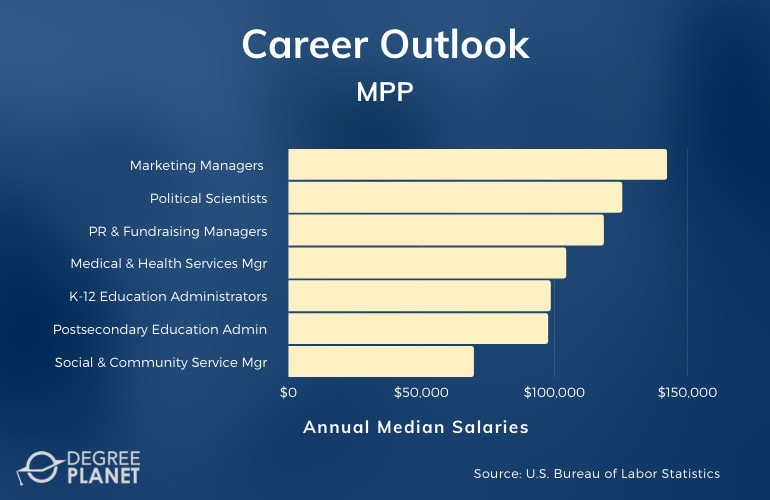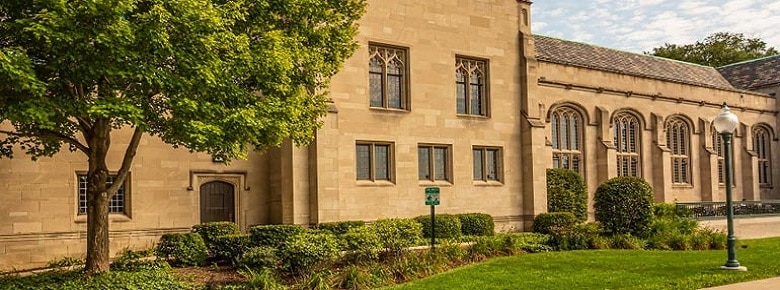Earning your online masters in public policy can lead to a variety of career opportunities in the government and non-profit sectors.

Graduates of an MPP online degree program tend to go on to become effective advocates for changes in policy management and development. The flexibility of this degree also means that you may qualify for roles within the field of business administration, such as marketing and public relations.
Editorial Listing ShortCode:
If you enjoy tackling difficult policy issues and are ready to further develop your communication, research, and analytical skills, pursuing an online Master of Public Policy may be right for you.
Online Master’s in Public Policy Programs

Public policy is the collection of actions taken by the government to tackle some of society’s most pressing problems. For example, public policy can impact laws, regulations, and decisions in a variety of areas, including education, health, and defense.
A master’s in public policy online program can give you the opportunity to study both the development and implementation of policy making. You can also learn to apply public policy theory to real-world situations, developing and delivering practical solutions. Because a masters in public policy program is focused on using what you learn to create real change, it is a strategic way to prepare for leadership roles in public policy.
Editorial Listing ShortCode:
Many graduates go on to become leaders in both the public and private sector as well as strong advocates for change at the government level. While every university is unique in the MPP curriculum they offer, you can expect to study a combination of theories from different disciplines, including political science and sociology.
You may take courses on topics such as:
- Research design in policy science
- Public finance and policy
- Policy implementation and administration
- Public management
While you may explore a variety of methodologies and theories, there will typically be an emphasis on applying these to current or plausible scenarios. The format for each program will vary, but many universities have a similar structure.
Most MPP programs consist of:
- Core course requirements
- Courses in a chosen concentration
- A capstone project
- An internship
This type of program will generally take about 2 years to complete, but you can check with your schools of interest to determine exact expectations and program lengths.
Common Public Policy Master’s Degree Specializations

Selecting an area of specialization within public policy can help you tailor your degree to align with your career aspirations post-graduation.
Here are a few potential concentrations:
- Environmental Policy. This specialization will explore the different laws and regulations that impact environmental programs. You can prepare you for roles that deal with analyzing and designing environmental policies.
- Health Policy. This concentration examines the impact of public research on policies related to health services. It is commonly pursued by those who are interested in a career in medical and health services management.
- Education Policy. This specialization provides the opportunity to study how educational laws and regulations have shaped our modern-day school systems, and it may include course topics like urban education.
- Public and Nonprofit Management. If you are interested in analyzing existing public and nonprofit policies and programs in order to help grow an organization, this may be the right concentration for you.
- International Development. Graduates of this program can expect to implement change in developing nations by analyzing policies and aiding in post-conflict recovery.
Depending on the emphasis that you choose, you can prepare yourself for a number of specialty roles in government agencies, public sector organizations, and nonprofits.
MPP Careers & Salaries

Many MPP graduates go on to pursue roles that positively impact a community in some way. According to the Bureau of Labor Statistics, here are some common careers for public policy professionals.
| Careers | Annual Median Salaries |
| Marketing Managers | $135,030 |
| Political Scientists | $122,510 |
| Public Relations and Fundraising Managers | $119,860 |
| Medical and Health Services Managers | $101,340 |
| Education Administrators, Kindergarten through Secondary | $98,420 |
| Postsecondary Education Administrators | $96,910 |
| Social and Community Service Managers | $74,000 |
| Market Research Analysts | $63,920 |
| Public Relations Specialists | $62,800 |
| Survey Researchers | $59,740 |
Because this is an interdisciplinary degree, you can receive training in a number of different areas, including statistics, law, economics, and politics. As a result, you can develop a strong set of skills that can be applied in many fields.
Editorial Listing ShortCode:
Although earning an advanced degree in public policy can lead to many potential careers, it does not guarantee a specific position or salary. Where you work and how much you earn is dependent on a number of personal factors, such as geographic location and prior experience.
Master of Arts in Public Policy Curriculum & Courses

While each university offers a unique curriculum, here are some foundational courses you can expect to take as part of your public policy program:
- Public Management: In this course, you’ll learn how to plan and execute public programs, studying topics like managing people, organizational culture, and decision-making.
- Law and Public Policy: This class provides an opportunity to examine current legal issues in public policy and to learn how to use laws when creating new public policies.
- Statistical Methods for Policy Analysis: This course is designed to provide the foundational skills needed to analyze data, so you will cover hypothesis testing, random variables, measures of central tendency, and dispersion.
- Economics of Development: In this course, you’ll explore the factors which impact economic development, examining areas such as growth theories, population growth, and education.
- Management of Organizations: Throughout this class, you’ll examine the features of successful organization management and explore the challenges faced by leaders in this role.
- Foundations of Policy Analysis: You’ll explore the most commonly used methods of analysis in the field as well as the models that are frequently used to solve problems.
- Ethics in Public Service: You’ll explore ethical dilemmas that arise within the field of public service, including patterns, surfacing issues, and trends.
- Public Budgeting and Financial Management: This is a foundational course intended to provide you with budgeting information and skills for each level of government.
- Principles of Public Administration: This course covers organizational theory and bureaucratic theory, and it offers a chance to explore the many theories behind the field of public administration.
- Institutional Leadership: This course explores organizational planning and decision-making within an institution, and it also explores the roles of motivation and communication in effective leadership.
You can also take more courses focused directly around your chosen concentration.
How to Choose an Online Masters in Public Policy Program

As you are getting ready to apply for your MA in Public Policy, it is helpful to consider a few areas which may inform your decision:
- Cost. School can be expensive. If you are on a budget, it can be useful to look into the cost of each program before you apply. Typically, online programs offer the least expensive options, but they may also charge extra fees for things like technology support.
- Location requirements. While most online programs offer all of their lectures and materials virtually, some ask you to visit campus for various reasons. If this is not feasible for you, you may want to make sure you check these requirements prior to applying.
- Learning format. You can check with your programs of interest to see if they offer synchronous or asynchronous classes. During synchronous courses, you’ll attend a class at a specified time and receive instruction in real time. An asynchronous course provides a series of lectures that can be watched and completed on your own schedule, as long as they are finished by the stated due date.
Understanding your own needs will help ensure that you apply to programs that meet your personal requirements.
Admissions Requirements

The specific requirements for admission will vary between institutions, but most universities ask for some combination of the following items:
- GRE or GMAT scores (if required)
- Application
- Letters of recommendation
- Official transcripts
- Work experience or resume
In addition to these documents, some schools ask for a small application fee as well as a personal statement essay. It’s beneficial to check the requirements for your schools of interest to ensure that you submit all the necessary materials.
Online MPP Programs Accreditation

In order to ensure that they offer the highest standard of educational services, a college or university can elect to undergo an accreditation process. This review process evaluates not only the learning materials and curriculum offered but the quality of staff and administration as well.
If your school is not regionally accredited, you are unlikely to qualify for financial aid. Additionally, employers tend to look for candidates who graduated from an accredited university, as it lets them know that you received high-quality training and information in your field.
Editorial Listing ShortCode:
You can go to the US Department of Education’s website to check if your schools of interest are accredited before you apply.
Financial Aid and Scholarships

Financial aid can be a relief to qualifying students who are hoping to attend a program that is out of their budget.
There are several forms of financial aid available to prospective students, including federal and state financial aid, employer tuition reimbursement, and scholarship opportunities. In order to determine the amount of federal aid you qualify for, you can fill out the Free Application for Federal Student Aid (FAFSA). It will consider factors like your family income and your enrollment status.
State aid varies by location, and it’s helpful to check the eligibility requirements in your state to see the type of financial help you can receive. Lastly, employer tuition reimbursement and scholarship opportunities will differ between companies and schools.
You can check your work benefits to see if they offer a reimbursement option. Similarly, you can research the available scholarships at your schools of interest so you can apply for them before the deadlines.
Public Policy Professional Organizations

Becoming a member of a professional organization can help you make connections with other like-minded individuals, and it may even lead to opportunities for advancement in your field.
Below are some of the organizations available for public policy professionals:
- American Society for Public Administration (ASPA)
- International Public Policy Association (IPPA)
- Association for Public Policy Analysis & Management (APPAM)
In addition to being a wonderful networking tool, joining a professional organization can help you keep up to date with current issues in your field.
What Is an MPP Degree?
A Master of Public Policy (MPP) is a program that prepares you to become an expert in analyzing and forming policy.
This degree is focused on conducting research into existing community issues and coming up with innovative solutions to these problems through the evaluation of existing laws and the design of new policies. While coursework does differ between universities, most public policy degree programs cover topics in research methodology, sampling design, policy and data analysis, and statistics.
Is Public Policy a Good Masters?

Yes, public policy is a good masters for many professionals. If you are a creative problem-solver who enjoys turning plans into action, then an MPP may be a good fit for you.
During your master’s program, you will be expected to research and design solutions to a variety of policy dilemmas. Additionally, you can also get the satisfaction of knowing that you are trying to create and influence community change.
There are many diverse career paths available within the field of public policy, including political scientist, medical or health services manager, and public relations manager.
What Can You Do with a Masters in Public Policy?

Because it is interdisciplinary in nature, a Master of Public Policy can pave the way to a number of exciting careers.
As an MPP graduate, you have the opportunity to enter the workforce with a solid understanding of research design and data analysis as it relates to public policy. This means that you may be qualified for a variety of roles in public, private, and government organizations.
Editorial Listing ShortCode:
A number of graduates pursue careers as political scientists, public relations and fundraising managers, and education administrators, depending on their specialties. The versatile skills you can develop in an MPP program can also be applied to positions in the fields of business and marketing.
After earning their masters degree, many public policy professionals continue on and earn an on-campus or online doctorate in public policy.
Are Online Masters Degrees Respected?

Especially since there are a significant number of prestigious universities now offering online options, most employers do respect online degrees.
There are still some employers, though, that have mixed feelings about an online degree and may show preference to a candidate who has obtained their degree through a traditional route. To ensure that you’re earning a credible degree, it is necessary to enroll in an online program that is regionally accredited.
As long as you can demonstrate that you have learned the necessary skills to be successful in a position, an online degree should be accepted by potential employers.
How Long Does It Take to Get a Masters in Public Policy Online?

A typical masters in public policy program takes 1 to 2 years to complete. If a masters program consists of 36 credit hours, it generally takes about 1 year to complete if you’re enrolled full-time, including summer courses. If there is a thesis requirement, or if you attend school part-time, it will often take you longer to complete your degree.
Some programs are tailored toward the needs of working individuals and offer part time masters in public policy options for self-paced study. In these instances, you can often finish your degree within a timeframe that works best for your schedule.
What’s the Difference Between Public Affairs vs. Public Policy Graduate Programs?
While a degree in public affairs and public policy are similar in many ways, they focus on building up different skills.
| Public Affairs | Public Policy |
|
|
Pursuing a degree in public policy can often lead to analytical work, while a degree in public affairs may open up leadership opportunities in the public sector.
What’s the Difference Between a Master’s Degree in Public Policy vs. Political Science?
A masters degree in public policy differs from a masters degree in political science in the central focus of each program.
| Political Science | Public Policy |
|
|
Studying political science can give you an in-depth understanding of the way our government functions. Meanwhile, a public policy program can help you address current problems by designing and implementing new policies.
What’s the Difference Between an MPA vs. MPP Degree?

A Master of Public Administration (MPA) and a Master of Public Policy (MPP) are both strategic options for people interested in the well-being of their community.
Here are a few significant differences between an MPA and an MPP.
| Public Administration | Public Policy |
|
|
If you are more action-oriented, you might consider an MPA. If you enjoy conducting research and analyzing policies, you might consider an MPP.
Is an MPP Worth It?

Yes, an MPP is worth it for many professionals. According to the Bureau of Labor Statistics, many jobs within the field of public policy are experiencing job growth at a rate as fast as the national average for all other occupations. Political scientists, for instance, are expected to see 9% job growth over the next ten years.
In addition to a positive job outlook, the multidisciplinary nature of an MPP degree means that you may be qualified for varied career opportunities. You might pursue jobs in the government, nonprofit, public, or private sectors. Public policy positions include legislative aide, policy analyst, and community outreach manager.
Editorial Listing ShortCode:
Transferable skills, steady job growth rate, and flexibility in career choice all contribute to the appeal of earning an MPP, meaning that a public policy degree is worth it for a number of students.
Universities Offering Online Masters in Public Policy Degree Programs
Methodology: The following school list is in alphabetical order. To be included, a college or university must be regionally accredited and offer degree programs online or in a hybrid format.

American Public University offers an online Master of Public Policy program through its School of Security and Global Studies. Classes start monthly and are 8 or 16 weeks long. Concentrations are available in Environmental Policy, Health Policy, Public Policy and the Law, National Security Policy, Cybersecurity Policy, and Space Policy.
APUS is accredited by the Higher Learning Commission.

DePaul University’s Master of Public Policy program bridges the study of policy with ethics-based problem-solving. The program can typically be completed in 2 years, and with classes available both online and in the evenings, it offers flexible options. Students must complete 10 core courses and 3 electives to graduate.
DePaul University is accredited by the Higher Learning Commission.

George Washington University offers a Master of International Policy and Practice. The program is fully online and intended for mid-career professionals. Full-time students can typically complete the program within a year, while part-time students can usually do so in 16-24 months. The program requires the completion of 27 credits and includes many elective options for customization.
George Washington University is accredited by the Higher Learning Commission.

Johns Hopkins University offers an MA in Public Management both online and on campus. It requires the completion of 12 courses and can typically be completed in 16-24 months. Students can start the program in the fall, spring, or summer. Three areas of focus are available: Public Administration and Leadership, Public Policy Evaluation, and Public Financial Management and Budgeting.
The Johns Hopkins University is accredited by the Middle States Commission on Higher Education.

Liberty University offers a Master of Arts in Public Policy that can be earned 100% online. Classes are just 8 weeks long. The program offers a general degree and specializations in Campaigns and Elections, International Affairs, Leadership, Middle East Affairs, Policy Studies, and Public Administration.
Liberty University is accredited by the Southern Association of Colleges and Schools Commission on Colleges.

The Master’s in Public Policy and Administration program from Northwestern University offers opportunities to study both the administrative and analytical sides of policy. Classes are available both on campus and online. Specializations are available in Public Administration, Public Policy, Global Policy, Global Health, and Data Analytics for Public Policy.
Northwestern University is accredited by the Higher Learning Commission.

Oregon State University offers a Master of Public Policy for professionals in the public and nonprofit sectors. Concentrations are available in Energy Policy, Environmental Policy, Rural Policy, and Social Policy. Students are expected to complete a capstone project and have the opportunity to participate in an internship. Courses include Professional Development Seminar, Econometrics, and Public Organizations and Leadership.
Oregon State University is accredited by the Northwest Commission on Colleges and Universities.

SUNY Empire State College offers a Master of Arts in Social and Public Policy. Students may choose between earning a general degree or a concentration in Public Administration. The program includes 10 courses for a total of 30 credits. Courses include Social and Public Policy Process, Social Policy Perspectives, and Policy Implementation.
SUNY Empire State College is accredited by the Middle States Commission on Higher Education.

The University of Massachusetts—Dartmouth offers an online program for a Master of Public Policy with concentrations in Educational Policy, Environmental Policy, and Public Management. Course offerings include Administrative Law, Organizational Behavior in Educational Settings, Policy Analysis, and Regional Economic Development Policy.
The University of Massachusetts – Dartmouth is accredited by the New England Association of Schools and Colleges and the Commission on Institutions of Higher Education.

The University of Northern Iowa offers an online Master of Public Policy program. It is a 2 year program that follows a cohort model. Fall and spring courses are 8 weeks long, and summer courses are 6 weeks long. Online students are invited to campus for orientation, but a virtual option is also available.
The University of Northern Iowa is accredited by the Higher Learning Commission of the North Central Association of Colleges and Schools.
Getting Your Master of Public Policy Online

Earning your online public policy masters degree is a strategic option for anyone who is interested in creating change at a high level.
You will have the opportunity to build your skills in the areas of research, data analytics, communication, and political knowledge. You can also learn to synthesize this information in order to develop solutions to society’s urgent policy issues.
If you are ready to begin your journey toward finding public policy master’s programs online, you can start exploring MPPs from accredited universities today.

